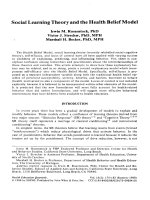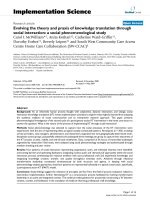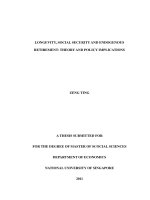Political theory and feminist social criticism
Bạn đang xem bản rút gọn của tài liệu. Xem và tải ngay bản đầy đủ của tài liệu tại đây (1.84 MB, 248 trang )
This page intentionally left blank
Political Theory and Feminist Social Criticism
In Political Theory and Feminist Social Criticism, Brooke Ackerly
demonstrates the shortcomings of contemporary deliberative democratic theory, relativism, and essentialism for guiding the practice of
social criticism in the real, imperfect world. Drawing theoretical
implications from the activism of Third World feminists who help
bring to public audiences the voices of women silenced by coercion,
she provides a practicable model of social criticism. She argues that
feminist critics have managed to achieve in practice what other
theorists do only incompletely in theory. Complemented by Third
World feminist social criticism, deliberative democratic theory
becomes critical theory ± actionable, coherent, and self-re¯ective.
While a complement to democratic theory, Third World feminist social
criticism also addresses the problem in feminist theory associated with
attempts to deal with identity politics. Third World feminist social
criticism thus takes feminist theory beyond the critical impasse of the
tension between anti-relativist and anti-essentialist feminist theory.
B r o o k e A c k e r l y is Visiting Assistant Professor in the Political
Science Department at University of California, Los Angeles.
Contemporary Political Theory
Series Editor
Ian Shapiro
Editorial Board
Russell Hardin Stephen Holmes Jeffrey Isaac
John Keane Elizabeth Kiss Susan Okin
Phillipe Van Parijs Phillip Pettit
As the twenty-®rst century approaches, major new political challenges
have arisen at the same time as some of the most enduring dilemmas of
political association remain unresolved. The collapse of communism
and the end of the Cold War re¯ect a victory for democratic and liberal
values, yet in many of the western countries that nurtured those values
there are severe problems of urban decay, class and racial con¯ict, and
failing political legitimacy. Enduring global injustice and inequality
seem compounded by environmental problems, disease, the oppression
of women, racial, ethnic and religious minorities, and the relentless
growth of the world's population. In such circumstances, the need for
creative thinking about the fundamentals of human political association
is manifest. This new series in contemporary political theory is intended to foster such systematic normative re¯ection.
The series proceeds in the belief that the time is ripe for a reassertion of
the importance of problem-driven political theory. It is concerned, that
is, with works that are motivated by the impulse to understand, think
critically about, and address the problems in the world, rather than
issues that are thrown up primarily in academic debate. Books in the
series may be interdisciplinary in character, ranging over issues conventionally dealt with in philosophy, law, history and the human
sciences. The range of materials and the methods of proceeding should
be dictated by the problem at hand, not the conventional debates or
disciplinary divisions of academia.
Other books in the series
Ian Shapiro and Casiano Hacker-CordoÂn (eds.)
Democracy's Value
Ian Shapiro and Casiano Hacker-CordoÂn (eds.)
Democracy's Edges
Political Theory and Feminist
Social Criticism
Brooke A. Ackerly
Cambridge, New York, Melbourne, Madrid, Cape Town, Singapore, São Paulo
Cambridge University Press
The Edinburgh Building, Cambridge , United Kingdom
Published in the United States by Cambridge University Press, New York
www.cambridge.org
Information on this title: www.cambridge.org/9780521650199
© Brooke A. Ackerly 2000
This book is in copyright. Subject to statutory exception and to the provision of
relevant collective licensing agreements, no reproduction of any part may take place
without the written permission of Cambridge University Press.
First published in print format 2000
ISBN-13 978-0-511-06841-6 eBook (EBL)
ISBN-10 0-511-06841-7 eBook (EBL)
ISBN-13 978-0-521-65019-9 hardback
ISBN-10 0-521-65019-4 hardback
ISBN-13 978-0-521-65984-0 paperback
ISBN-10 0-521-65984-1 paperback
Cambridge University Press has no responsibility for the persistence or accuracy of
s for external or third-party internet websites referred to in this book, and does not
guarantee that any content on such websites is, or will remain, accurate or appropriate.
For Annlyn and her world
Contents
Acknowledgements
page x
1
Silent voices and everyday critics: problems in political theory,
solutions from Third World feminist social criticism
2
A Third World feminist theory of social criticism
33
3
Method: skeptical scrutiny, guiding criteria, and deliberative
inquiry in concert
73
4
Roles: social criticism and self-criticism
121
5
Quali®cations: everyday critics, multi-sited critics, and
multiple critics
150
6
Third World feminist social criticism as feminism
178
Bibliography
Index
1
204
230
ix
Acknowledgements
The problems associated with inequality and the inability of some
people in a society to attain a public audience have interested me
academically since college. Therefore my primary intellectual debts are
to Professors of Economics Henry Bruton and Roger Bolton of Williams
College who oversaw my ®rst look into problems of inequality in
Malaysia and instilled in me a passion for academic inquiry.
Next I owe tremendous personal and intellectual debts to those
everyday critics in Bangladesh who educated me and to those development professionals who enabled my work with so many village women
and development workers in Kustia, Tangail, and Brahmanbaria. In
particular, I wish to thank Tom and Lisa Krift for inviting me to base my
research in Bangladesh. Elke Kraus gave me my ®rst home in Dhaka,
introduced me to my closest friends in Bangladesh, and enabled me to
spend formative time in Kustia with the women's savings group members
from Tangail. My intellectual debt to her and them is obvious from the
®rst pages of this book. By sharing their home life with me during their
time of family crises, Adil and Naju Sha® let me experience their needs
and concerns as if they were my own. Finally, I am grateful to Dorothy
``Bina'' D'Costa who, with the help of Jagadindra ``Bappi'' Majumder,
transformed me from an outside observer to a multi-sited critic. I have
learned much from our continued deliberative exchange over the years.
My intellectual debts to Joshua Cohen, Martha Nussbaum, and
Michael Walzer are evidenced by these theorists' central presence in this
book. Though generally critical of their conclusions, I ®nd their scholarship engaging and important. I consider my own work to complement
and further, not refute, theirs.
I am grateful to the academic communities at Stanford, Yale, and
UCLA that provided stimulating environments during the development
and polishing of the ideas in this book. In addition, ongoing conversations with Elisabeth Friedman, Bina D'Costa, and Anne Marie Goetz
throughout this project have helped me continue to see this work in its
x
Acknowledgements
xi
larger contexts of political theory, development practice, and Third
World women's activism.
During the writing of the book, audiences at Wellesley College, the
University of Arizona, and the annual meeting of the American Political
Science Association offered provocative questions that pushed me to
clarify parts of the argument. Particular among these were questions
from Joel Krieger, Cary Nederman, Cheryl Hall, and Melissa Lane. In
addition, Victor Wolfenstein and Iris Marion Young offered thoughtful
commentary based on the text of those remarks that pushed me to
situate my work in the context of postmodernism and relativism.
The text itself has bene®ted from many readers. Mark Tunick offered
careful attention to early drafts and made an inspiring investment in the
quality of my writing. Debra Satz and Jim March asked provocative
theoretical questions in response to early drafts. Elisabeth Hansot
provided thoughtful and thorough comments on the organization and
argument of the book. Ian Shapiro offered suggestions about emphasis
and organization that were essential to its current form. Nancy Hirschmann read the manuscript critically and constructively twice. Her
advice guided its reorganization and her comments improved its overall
quality. Any errors and vagaries that remain do so despite their
thoughtful efforts.
For comic relief early on and attention to the readability of the ®nal
manuscript, Rebecca Todd deserves special thanks. For ushering the
book through the editorial process with the right combination of
discipline and cheer, I am grateful to John Haslam. Others have read
parts of the manuscript. Phyllis Barnes gave an inspired read of the ®rst
chapter. Michael Goodhart offered thoughtful comments on chapter
two. Elisabeth Friedman provided critical commentary on the discussion of the women's rights movement in chapter four. In addition to
their thoughtful commentary, these readers have identi®ed a ¯aw or
endearing feature of the book: no chapter stands on its own. In my effort
to explicate my ideas while acknowledging my intellectual debts I have
had to make decisions about the order of discussions. The reader may
not like my choices. On occasion I refer the reader to other chapters but
I expect the impatient reader to make good use of the index to ®nd the
discussions that interest her.
For encouragement I thank my family who have been a personal
resource throughout this project. Speci®cally, Katherine Stevenson,
Chris Stevenson, Ann Jacobs, Carl Jacobs, and Rick Ackerly kept the
road to completion paved and plowed.
A J. William Fulbright Research Fellowship funded the Bangladesh
xii
Acknowledgements
research and the American Association of University Women American
Fellowship funded the early writing process.
Finally and most importantly, I owe special thanks to two people who
in different and complementary ways have helped strengthen me as a
scholar and a person. Susan Okin has seen my thoughts develop from
seemingly unrelated re¯ections on Aristotle and efforts to articulate
respectful feminist criticism of power dynamics in families under the
economic stress of poverty into a coherent manuscript. Her con®dence
has been motivational from the beginning. Moreover, her careful and
respectful though critical readings of others, coupled with a clear
theoretical message of her own and an enduring concern about injustice
in the world, make each piece of her scholarship a model.
Bill Zinke has likewise witnessed the development in my thought. He
has been convinced since its earliest articulations that Third World
feminist social criticism is relevant to criticism beyond the scope of
feminist concerns and thus misnamed. I agree; feminist social criticism
is political theory. While I still hold to the label I have chosen for reasons
explained in the text, I thank him for considering every deliberative
exchange about feminism an opportunity to envision feminism as
humanism.
Martha Nussbaum, Political Theory (20, 2), p. 222, copyright # 1992 by
Sage Publications, Inc. Reprinted by Permission of Sage Publications,
Inc.
1
Silent voices and everyday critics: problems
in political theory, solutions from Third
World feminist social criticism
When you live in the water, you don't argue with the crocodiles.
(Bengali proverb)
Prologue
In Bangladesh in September of 1993, I accompanied a group of rural
women from Tangail who were members of Save the Children women's
groups on their visit with rural women of Kustia who were members of
Soptagram women's savings groups.1 On the afternoon of the third day,
as we walked from a workshop on women's legal rights to a meeting
between the women's groups, we heard shrieks of terror coming from a
household compound on the other side of a rice ®eld. ``What's going
on?'' I asked. Sahara, a Tangail woman, turned to me with anger and a
memory of terror in her eyes and hit her right ®st into her cupped left
hand. She had experienced domestic violence and recognized the
sounds from across the ®eld.
After a time, Sahara asked, ``Do husbands beat their wives in your
country?'' ``Some do,'' I answered, ``even though it is illegal.'' We all
laughed at the irony, having just learned about women's formal legal
rights in Bangladesh and noting how they differed from local practice.2
1
2
Save the Children is a US-based international nongovernment organization (NGO)
operating in Bangladesh; Soptagram is a Bangladeshi NGO operating in the western
portion of the country primarily in Kustia. Tangail and Kustia are two thanas, a regional
designation with the approximate political function of a county in the United States.
Tangail is in the center of the country near the capital, Dhaka; Kustia is on the western
border with India. Most of the women on the trip had never been outside their thana.
As a result of women's activism in the late '70s against all forms of violence against
women, but especially dowry-related beatings and death, Bangladesh passed laws
protecting women ( Jahan 1995). These include the Dowry Prohibition Act of 1979, the
Cruelty to Women Punishment Ordinance of 1983, the Child Marriage Restraint Act of
1984 (making marriage illegal for girls under the age of 18 and for boys under 21), the
Illegal Traf®cking of Women Act of 1988 and the Family Court Ordinance of 1985.
These laws are regularly violated in social practices. For example, although national
statistics are unavailable, it is generally con®rmed in local studies that dowry is now paid
in nearly all Hindu and Muslim marriages. When the law was passed, generally Hindus
1
2
Political Theory and Feminist Social Criticism
``Why do men hit their wives?'' I asked. ``Because they had a bad day.
Because they are poor,'' answered Sahara. ``Because the rice is too hot,
or there is not enough rice,'' said Apfza, a woman from Kustia. Then she
added, ``A good husband does not beat his wife even when they are
poor.''
Then Jahanara, another Tangail woman overhearing our conversation,
told the story of her women's group which went as a group to the house
of a member who was being abused and asked her husband to stop
beating her. This reminded another Tangail woman walking ahead of us
of another group's effort to get a member's husband to allow their
daughter to continue in school even though he was ready to arrange her
marriage. They staged a sit-in at the member's home.
Although separately they had used their groups as bases of collective
action, before their walk together in Kustia, the Tangail women's groups
were unaware of each other's collective actions. Together, they recognized that their collective action caused the husbands' public embarrassment and brought public attention to their views on domestic violence
and girls' education. By the time we arrived at the meeting place, the
women were energized by their stories. Through their dialogue, the
Kustia and Tangail women recognized that the examples of group action
were not isolated. They identi®ed collective action as a tried and
effective method of breaking out of coerced silence in order to voice
social criticism and to in¯uence social decision making. And they
learned they possessed the means of an effective form of activism.
The main purpose of the trip was for Save the Children to train its
Tangail women's groups in leadership and group management skills so
that they could sustain themselves when Save the Children ceased
working in Tangail. Save the Children was in the process of focusing
their efforts in the more economically challenged region of Nasrinagar,
to the northeast. The conventional approach to such a training would
have been to bring leadership trainers from elsewhere in Bangladesh to
Tangail. However, the principal program of®cer proposed the training
be conducted by Soptagram leadership trainers in Kustia for a number
of reasons. The journey to Kustia would provide the Tangail women
with a life experience that would make them unique in their villages.
Women and most poor men do not travel beyond their villages except
(for women) to marry. The experience of bidesh (``foreign'') travel would
strengthen their position in the community, bene®ting the women and
their groups. The women were required to get their husbands' permission for the trip. Having one's wife go was a source of status for most
practiced dowry and Muslims, particularly poor Muslims, practiced it in less than 20%
of marriages (Timm & Gain 1992: 74; White 1992: 104±106).
Silent voices and everyday critics
3
men, so they granted their support for their wives' trips and correspondingly, for their wives' ongoing participation in the groups.
The purpose of bringing the Tangail women to Kustia (an all-day
journey) for a week was to allow women from different backgrounds
who had been participating in women's groups sponsored by Save the
Children in Tangail and Soptagram in Kustia to learn from each
others' experiences. The program of®cer expected that, together, uninhibited by family pressures, the women would speak freely about their
lives and honestly about the potential for their families to inhibit the
success of the groups. By locating the training in Kustia, Save the
Children would remove the women from their families and community
temporarily and thereby free them from some social constraints that
might otherwise inhibit their interactions. In addition Save the Children
identi®ed Soptagram as the ideal partner for this training as they had
their own women's groups and shared the goal of women's empowerment. Both Soptagram and Save the Children thought their groups
would be strengthened by meeting each other. They did not know what
the Tangail and Kustia women would learn from each other, but Save
the Children hoped that the Tangail women would learn that they
could be self-reliant and that they did not need Save the Children to
keep their groups sustained.
The groups' activism before coming to Kustia and their sharing their
experiences in Kustia are examples of social criticism in a context of
coercive gender hierarchy. The deliberation in Kustia between Tangail
and Kustia women was a form of deliberation that resulted in the shared
learning among the women in an environment secure from potentially
harmful gender inequality. The activism of the Tangail women of
staging sit-ins to in¯uence their husbands is an example of critics trying
to make an otherwise insecure environment one in which their voices are
heard. Before a background of gender inequality, these women demonstrate deliberation as important social criticism. Ignoring the Bengali
proverb, these women have found a means to argue with the crocodiles.3
The anecdote and social criticism
Although this anecdote does not give us a complete account of Third
World feminist social criticism, it provides an illustration and a starting
point for my subsequent discussion. While it seems like a story about
3
Sarah C. White provides the source of the proverb in Arguing with the Crocodile (1992).
For more general discussions of women's activism in the context of gender hierarchy in
Bangladesh see White (1992) for a local and anthropological description and Roushan
Jahan (1995) for a more general and political description.
4
Political Theory and Feminist Social Criticism
particular women, the story actually reveals the critical components of
my philosophy of social criticism. This anecdote raises three sets of
questions about social critics and social criticism in everyday life: how
do social critics do social criticism? what do social critics do? and who is
a social critic? A philosophy of social criticism needs to give a general
account of the method, roles, and quali®cations of social critics.
Through this anecdote, I offer a glimpse of the method of social
criticism practiced by women activists. Having discussed the problems
of domestic violence among themselves, the women on the walk identify
collective action as a potential means of making their social criticism
heard. Being heard is no guarantee that their social criticism, once
made, will successfully in¯uence social change. These women live under
familial, social, political, and economic values, practices, and norms
that enforce women's silence.4 However, they have identi®ed a way to
break that silence with each other and to force their husbands to hear
them. As critics, these women challenge the common practice of wife
battery and they assert a daughter's right to an education. Their method
is to inform themselves through collective dialogue, to challenge generally accepted values, practices, and norms, and to advocate for those
things they believe women should have, in this case safety in their homes
and an education.
The critics in my anecdote also demonstrate the multiple roles of
social critics. Critics promote inquiry. The foreign researcher asked
questions: ``What's going on?'' and ``Why do men hit their wives?''
Critics promote deliberation. By asking questions I facilitated inquiry
among the women. Individual women shared their understandings of
the causes of domestic violence. The women described using collective
action to enable their participation in deliberation about the values,
practices, and norms that affect their lives. Critics promote institutional
change. By bringing the women together in the ®rst place, Save the
Children under the initiative of its program of®cer acted as a social critic
by offering a unique institutional environment for the women. I call this
an institutional change because it changed (temporarily) the conventional context of women's interaction with each other and created a
4
By ``values, practices, and norms'' I mean to include the familial, social, economic and
political institutions of a society including formal laws and legal organizations (like
legislatures or courts), informal practices like dating, and hybrid practices such as
marriage which are guided by both formal laws, organized religion, and informal norms.
I mention familial values, practices, and norms separately from social ones because I
want to be able to distinguish between family activities and those social activities that are
not directly related to the family. Although I refer to them as a society's values, practices
and norms, I do not mean to imply that they are recognized or practiced universally
within that society.
Silent voices and everyday critics
5
unique opportunity for interaction since poor rural women rarely
exchange experiences with strangers. The process might promote
further inquiry, deliberation, and institutional changes when the women
go home to their communities. All three roles of critics can overlap and
all three can be directed at visible practices such as domestic violence or
at more foundational social values and norms such as gendered power
inequalities. By promoting inquiry, deliberation, and institutional
change in an otherwise coercive and oppressive environment, critics may
promote social change that is more informed, collective, and uncoerced.
By informed, I mean that all views are heard and given the respect of
critical attention. By collective, I mean that perspectives are shared so
that together society has more information (though some information
can be misleading). And by uncoerced I mean that views are expressed
freely and speakers are uninhibited by norms of behavior or by speci®c
threats from others.
Finally, the anecdote demonstrates that the quali®cations of social
critics are not exclusive. The critics in the story are real people, doing
their jobs and living their lives. They are a foreign researcher who asked
a question, a woman who experiences domestic violence in her home,
another who is familiar with it in her neighborhood, two groups of
women who acted in concert to voice their criticism of wife abuse and
their desire to educate their daughters, the Save the Children program
of®cer, and the two development organizations. They are individuals
and collectivities; they are foreigners, locals, and people who cannot
neatly be categorized as either; they have thought about these issues
alone, but they work in concert for social change. Who among these are
social critics? All are.
Everyday people walking in an everyday place, undocumented by
reporters is not what people commonly think of when they picture social
critics or activists. But, I argue that these women are active in their
social criticism and by example offer a model of social criticism appropriate for those otherwise silenced by the values, practices, and norms of
their daily lives. This is not to say that, when using the method I outline
to do the roles I describe, the critics I identify will be able to effect social
change. Social criticism is one way to counter, mitigate, or undermine
power inequalities, but whether a particular critical effort will be
effective is a matter of politics.
Social criticism and political theory
Contemporary deliberative liberal democratic theory provides the
context for the theory of social criticism I propose. Deliberative theorists
6
Political Theory and Feminist Social Criticism
have outlined principles for framing discussion, designed institutions for
promoting free and equal discussion, and even brought to life a model
deliberative forum. Explicit and implicit in their work is criticism of a
society in which political power is unevenly disbursed and an argument
that more inclusive public deliberation will enhance the legitimacy of
political decision making even while those decisions remain largely in
the hands of representatives.
Despite its critical implications, deliberative theorists have yet to show
how to use deliberation in everyday life to bring into practice the
assumptions, principles, institutions, and models that are the substance
of their theories. An account of social criticism is an essential complement to deliberative theory if the latter is to be a credible attack on
power inequalities.
Were deliberative theorists to give greater attention to the sources of
inequality and misinterpretation in the real world, they might also
recognize that an account of social criticism is a valuable component of
a political philosophy. Educative deliberation ± that is, deliberation for
the purposes of contributing to a society's collective learning process,
discovery, and knowledge ± is the basis of the complementary philosophy of social criticism I propose. Given the importance of educative
deliberation to social decision making, the critic's role is to promote it;
critics from a variety of perspectives contribute to it; good critics make
use of it in their methodology.
In the exposition of their political theories democratic theorists
provide an account of how citizens generally participate in democratic
society and decision making as they describe it. They give accounts of
the education required to participate thus, and they give examples of the
institutions that will enable citizens to participate as described. And yet,
when it comes to social criticism ± to giving an account of how those
same citizens can participate in bringing about the polity they describe ±
these theorists are silent. At most they give an account of the role of the
political theorist as social critic. But political theorists are not the most
important political actors in bringing about social change; certainly, we
ought not to base our hopes for seeing greater democracy realized on the
theorists' ability to make a sound argument. Really, social change
toward greater or worse democracy is brought about by those same
citizens who will participate in the improved polity once achieved. And
so, it makes sense that a democratic political theory should have something to say about how social criticism might in¯uence social decision
making such that social change toward a more democratic society
(however envisioned) is possible. The theorist or philosopher of social
criticism cannot predict how effective a given practice of social criticism









